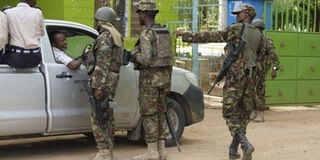We can reject bad leaders when politicians come up

Kenya Defence Forces officers put tight security at the entrance of Garissa University College on April 3, 2015 after a terrorist attack by Al-Shabaab militants. 2015 will likely be remembered for the Garissa University’s attack; insecurity in northern Kenya; and a heavy-handed state security response. PHOTO | JEFF ANGOTE | NATION MEDIA GROUP.
What you need to know:
- Instead, 2015 will likely be remembered for terrorist attacks (most notably Garissa University’s when 148 people were killed); insecurity in northern Kenya; and a heavy-handed state security response.
- At the same time, this competition provides opportunities for new candidates to emerge and be elected, and for ordinary citizens to reject those who are not deemed to have performed in office.
History will likely not be kind to 2015.
Instead, 2015 will likely be remembered for terrorist attacks (most notably Garissa University’s when 148 people were killed); insecurity in northern Kenya; and a heavy-handed state security response.
The latter associated with claims of a resurgence of extra-judicial killings – not just in the north, but also at the Coast and of alleged criminals in urban areas.
2015 will also likely be remembered as the year that corruption reached unprecedented heights.
Indeed, almost every month was marked by another scandal – be it within the National Youth Service, the fate of the Eurobond billions, or the shady deals that led to the collapse of Imperial Bank.
At the same time, 2015 bore witness to a further localisation of graft, as new layers of taxation, procurement, and planning associated with devolution provided new opportunities for politicians, state officers and businesses to be corrupt.
However, rather than dwelling on the past, I want to consider some of the opportunities that 2016 brings.
First, 2016 will be a year of campaigning as politicians look to elections in 2017.
These campaigns are likely to be particularly heated around the gubernatorial and MCA positions, which were not heavily contested in 2013, but which are now a source of great interest given the resources and powers they are associated with.
This heightened political competition will provide perverse incentives for politicians to acquire wealth and redistribute patronage in their efforts to maintain or seek political office.
It may also exacerbate intercommunal relations in certain parts of the country, as some politicians draw upon narratives of historical injustice and fears of future marginalisation to mobilise support.
However, at the same time, this competition provides opportunities for new candidates to emerge and be elected, and for ordinary citizens to reject those who are not deemed to have performed in office.
ONEROUS TASK
Second, implementation of the Constitution will continue.
This will offer opportunities for further reform, but may also fall foul of vested interests.
Of particular significance will be the police vetting, which, in 2016, will focus on local police chiefs and officers in particular departments.
Vetting of police chiefs between 2013 and 2015 faced heavy criticism, as a number of officers who initially failed managed to remain in office.
In addition, most of the evidence brought before the panel related to economic crimes, rather than to human rights abuses, fuelling claims that people were unable or unwilling (perhaps due to fear) to present the kind of evidence required.
However, ongoing vetting provides further opportunities to clean up the police service.
This includes the vetting of 12,000 officers of all ranks in the traffic department.
Finally, Parliament will reconvene and continue to debate and legislate.
One of the initial documents tabled for discussion is the Truth, Justice and Reconciliation Commission (TJRC) report, which has been pending since July 24, 2013.
In early December, MPs pledged to prioritise debate of the report when Parliament reconvenes in February.
KENYANS' ROLE
This followed a petition brought before the National Assembly by the MP for Wajir South on behalf of the National Victims and Survivors Network.
The petition requested that Parliament adopts the report and allocate “sufficient budget for the immediate and effective implementation of the recommendations contained in the report, in particular reparations of victims.”
If this debate takes place, and if the TJRC report is accepted, it could have far-reaching implications given the range of recommendations made.
It is thus critical that there be some public discussion of the report and its key findings and recommendations before parliamentary debate takes place so that people can lobby their MPs to accept or question the report depending on whether they believe that implementation would make a positive contribution to Kenya’s future.
Indeed, as with the fight against corruption, the election of leaders, and police vetting, ordinary Kenyans have a key role to play in helping to shape their country’s future, and to thus forge the way in which 2016 will be remembered.





